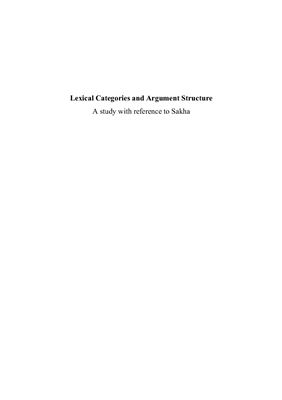Utrecht: LOT, 2005. - 480 p.
Historical Prelude
P?nini
Plato and Aristotle
The Stoics
Dionysius Thrax
Latin grammarians: Varro and Priscian
A summary: from Plato to Priscian
Further historical developments
Introduction
Lexical categories: Features versus configurations
Lexical categories: The generative background
Lexicon versus Syntax
Two alteative approaches to argument structure
The extended proposal
The proposal in a nutshell
Structure of the dissertation
Decomposing Lexical Categories in Sakha
The inventory of roots and suffixes
Against bare roots
Derivation: Lexicon versus syntax
Deriving nouns in the lexicon and syntax
Deriving adjectives in the lexicon and syntax
Concluding remarks
Nouns in Sakha
Possession
Nominal compounds: The lexicon/syntax division
Baker’s (2003) criterion of identity
Nouns as arguments
Concluding remarks
Adjectives in Sakha
Predication
Tense and the three types of predicates
Embedded predication and the obligatoriness of buol ‘be’ with nonfinite nominal predicates
Extractions out of predicates: the nominal/adjectival/verbal asymmetry
Attributive modification
Adverbial modification
The use of adjectives as arguments
Impersonal subjects
Concluding remarks
Causatives and Unaccusatives
Causative/unaccusative alteations
Verb-based derivation
Causativization
Causativization in Distributed Morphology
Concluding remarks
Decomposing Accusative Case
Accusative case in Theta system
Thematic accusative in Sakha: NP-arguments
Unaccusatives: Accusative case reduction and morphological marking
Reflexives: Lexical bundling
Inalienable possession reflexives and benefactives
Lexical and syntactic passives
Reciprocals
Double accusative in causatives
Double accusative and the part-whole relationship
Accusative subjects in Sakha
Syntactic approaches to Case
Denominal Verbs
Recapitulating Hale and Keyser (1993, 1998, 2000)
Denominal LAA-verbs
Denominal verbs, arity operations and accusative case
Denominal verbs ending in suffixes other than –LAA
Unergative verbal roots and unergative verbs as ?-suffix combinations
Conclusions
Appendices
Bound roots in Sakha
Root words in Sakha
Word formation in Sakha
Causative/unaccusative alteation in Sakha
n-marking in Sakha
References
Samenvatting in het nederlands
Acknowledgements
Historical Prelude
P?nini
Plato and Aristotle
The Stoics
Dionysius Thrax
Latin grammarians: Varro and Priscian
A summary: from Plato to Priscian
Further historical developments
Introduction
Lexical categories: Features versus configurations
Lexical categories: The generative background
Lexicon versus Syntax
Two alteative approaches to argument structure
The extended proposal
The proposal in a nutshell
Structure of the dissertation
Decomposing Lexical Categories in Sakha
The inventory of roots and suffixes
Against bare roots
Derivation: Lexicon versus syntax
Deriving nouns in the lexicon and syntax
Deriving adjectives in the lexicon and syntax
Concluding remarks
Nouns in Sakha
Possession
Nominal compounds: The lexicon/syntax division
Baker’s (2003) criterion of identity
Nouns as arguments
Concluding remarks
Adjectives in Sakha
Predication
Tense and the three types of predicates
Embedded predication and the obligatoriness of buol ‘be’ with nonfinite nominal predicates
Extractions out of predicates: the nominal/adjectival/verbal asymmetry
Attributive modification
Adverbial modification
The use of adjectives as arguments
Impersonal subjects
Concluding remarks
Causatives and Unaccusatives
Causative/unaccusative alteations
Verb-based derivation
Causativization
Causativization in Distributed Morphology
Concluding remarks
Decomposing Accusative Case
Accusative case in Theta system
Thematic accusative in Sakha: NP-arguments
Unaccusatives: Accusative case reduction and morphological marking
Reflexives: Lexical bundling
Inalienable possession reflexives and benefactives
Lexical and syntactic passives
Reciprocals
Double accusative in causatives
Double accusative and the part-whole relationship
Accusative subjects in Sakha
Syntactic approaches to Case
Denominal Verbs
Recapitulating Hale and Keyser (1993, 1998, 2000)
Denominal LAA-verbs
Denominal verbs, arity operations and accusative case
Denominal verbs ending in suffixes other than –LAA
Unergative verbal roots and unergative verbs as ?-suffix combinations
Conclusions
Appendices
Bound roots in Sakha
Root words in Sakha
Word formation in Sakha
Causative/unaccusative alteation in Sakha
n-marking in Sakha
References
Samenvatting in het nederlands
Acknowledgements

